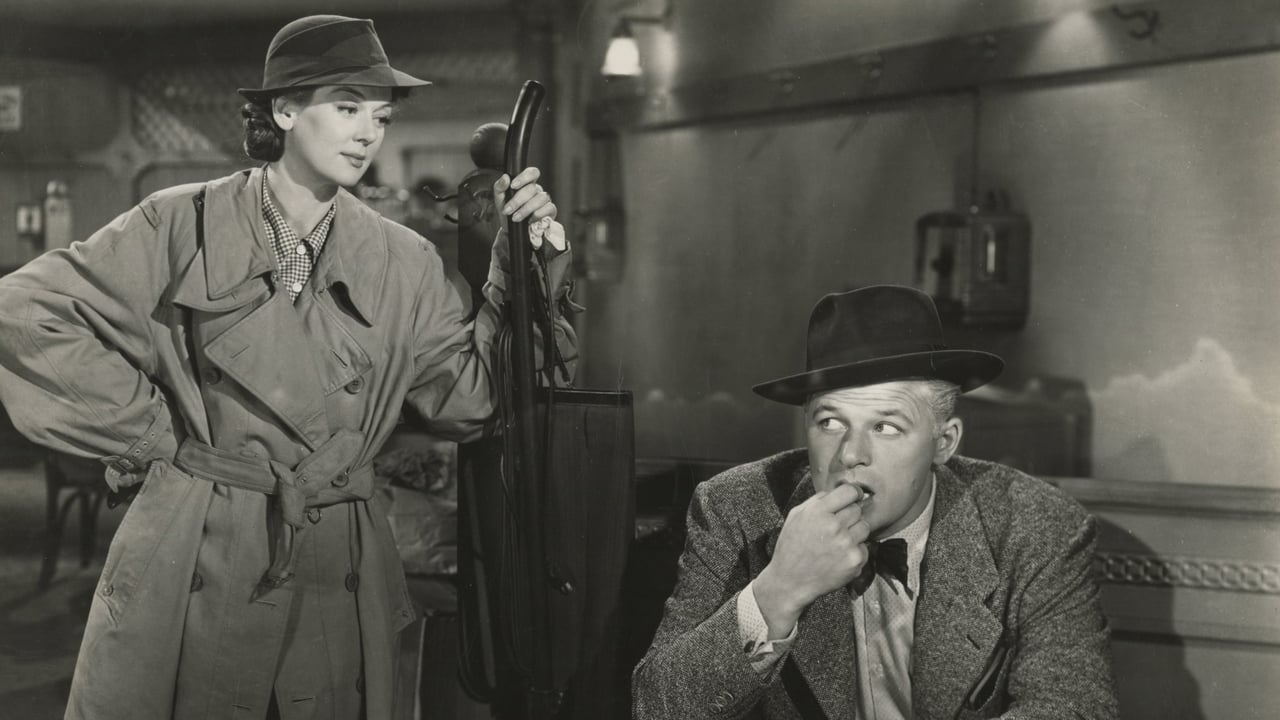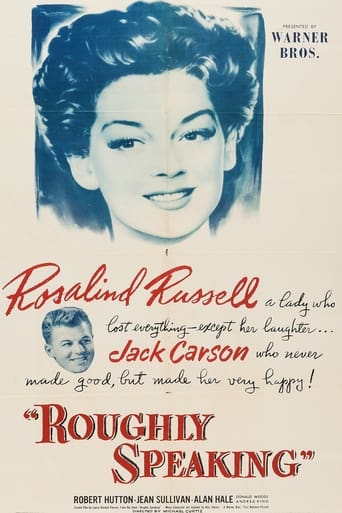Glucedee
It's hard to see any effort in the film. There's no comedy to speak of, no real drama and, worst of all.
Sharkflei
Your blood may run cold, but you now find yourself pinioned to the story.
Brendon Jones
It’s fine. It's literally the definition of a fine movie. You’ve seen it before, you know every beat and outcome before the characters even do. Only question is how much escapism you’re looking for.
Usamah Harvey
The film's masterful storytelling did its job. The message was clear. No need to overdo.
JohnHowardReid
The life story of a nonentity. Incredibly, Hollywood let this amateur write the script herself (something they wouldn't let even a pro like William Faulkner do) and the script is just that - amateurish. True it has something, authenticity, drive, even wit and sparkle and Mike Curtiz makes it all go by so fast for the first hour or so; but then the interest of the director seems to die with the script and, oddly enough, the disappearance of Donald Woods. Woods is a mechanical and unconvincing actor, far too old for an undergraduate, but Curtiz spikes up his scenes with elaborate camera movement (the dolly shot through the snow in the proposal scene) and effects (repetition of the record scratching out "Rock-a-Bye Baby") - maybe he felt Woods needed help. He sure did! But when Carson makes his belated entrance, Curtiz is content to let the camera run for long takes on such incredibly boring material as Jack's simulation of a vacuum cleaner salesman.After this low point, the script even starts to repeat some of the sharp one-liners from the first half of the film. It all ends, inconclusively and somewhat downbeat, in a railroad station as the camera dollies away from Russell and Carson through the scurrying crowds (we suspect that is Harry Hayden's voice on the loudspeaker) to The End title. Mind you, the film doesn't lack production values. A fortune has been poured into it. It has sets and atmosphere, good acting (the principals are their usual selves, but the script also has parts for a goodly parade of character actors including Alan Hale (one scene only) and some believable kids, but most of all an original Steiner score consisting mostly of generously and richly repeated excerpts from By The Light of the Silvery Moon and Bulldog Bulldog. Also We're in the Money, Oh You Beautiful Doll, It Had to be You. Oddly enough, it's the downbeat, very ordinarily directed scenes that stay in the memory, like the Pierson's losing their shirts because of a glut of roses. Fortunately, Walker's moody black-and-white photography overcomes and dampens Miss Russell's relentlessly jolly, perky performance (about which even Donald Woods justifiably complains).
SpruceLee
I thought I'd seen everything Curtiz had done. TCM snuck this one in late this afternoon. Maybe it should be an 8pm feature around a minor holiday. It's that good.With great chemistry two of my favorites, Russell and Carson, create a memorable depiction of married life thru the first half of the 20th century, while manoeuvring their ups and downs, rearing children and finally within view of the '39 NY World's Fair, as the Polish Pavilion shuts down, personally struggle with the onslaught of WWII; lots o' emotional swings supported by numerous others in the movie, all of whom deliver.It's too bad Russell and Carson didn't pair up for more films. They work together as well as any of their other pairings.
krdement
Long after this movie's release, the term "Slice of Life" was coined to describe films such as this. I dislike labels, and I especially tend to dislike modern films for which this term was coined. However, it seems like an apt label for this movie which I paradoxically love. (This comment provides as much insight into film history as it does into my own character.) I admit to being a sentimentalist. Consequently Slice of Life films from the thirties to the late forties usually appeal to me far more than later films. A lot of Slice of Life movies since the late forties seem to me to be rather pointless, rather tragic - or worse - both! Like any art form, films express the ethos of the culture in which they are made. I sometimes lament the passing of the society that produced Slice of Life films from the thirties to the late forties...Roughly Speaking is a film that is full of tragic events, but none seem pointless or even tragic. In that sense it is moralistic. As their dialog during the film's fadeout clearly indicates, Rosalind Russell and Jack Carson seem made for each other in their twin indomitable spirits. That spirit imbues this entire film with optimism. If the film seems at times to be overly sentimental (even maudlin to some), I think it is because today most people think of that kind of optimism, itself, as overly sentimental. Raised by parents who experienced the Great Depression and WWII, I can imagine a time when such optimism was not deemed overly sentimental or unbelievable. This film epitomizes that time and those people, and it speaks to my heart and soul. It inspires me and makes me yearn today for such a milieu, in a retrospective way that was not possible for audiences at the time of the film's release. So, for me this movie has grown in stature and improved with age.Russell is one of those actresses who is capable of delivering a performance that evokes laughter and yet tugs at your heartstrings. Carson is not usually seen in roles that offer him the opportunity to portray such nuanced characters. Here he is, and he shines. He was one of the era's great "second bananas." When I see him in a film such as this or Mildred Pierce, I regret that he wasn't given more meaty, starring roles. In this movie Russell is the strength and Carson is the vision - they are a great team, and I enjoyed seeing them grow old together.The ending does come rather abruptly. Yet for those who lived through WWII, there is enough foreshadowing for the rest of the story to be imagined in a general sense. Hardly any family that sent as many sons to the war was blessed to see them all return home. This family had seen plenty of hardship, and would, no doubt, see more. But it would overcome...This doesn't seem overly sentimental to me - just optimistic.
willowgreen
A long but pleasantly sentimental journey. This delightfully odd-ball film is based on the real-life story of one Louise Randall Pierson, an eccentric free-spirited woman who was ahead of her time in her thinking and actions. This lady didn't need the assistance of women's liberation movement! The film opens in 1912 and ends during WWII. In between are many amusing episodes. Louise's first failed marriage, her daughter who suffered infantile paralysis and her introduction to her future second husband (Jack Carson) - in a fish pond while dressed up for a costume party linger in the memory. Rosalind Russell is superb as Ms Randall-Pierson, and although the film is a mite long at 117 minutes, it is expertly directed by Michael Curtiz, the dramatic and comical aspects being cleverly balanced. Highly recommended as a fine example of a forgotten fine movie to remember.

